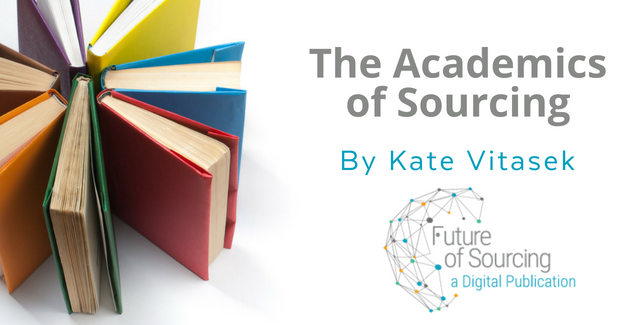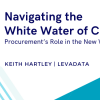By design this column has, for the most part, examined the theories and research of academic and economic luminaries that have helped form the basis of modern outsourcing and my own research and development efforts in the realm of collaborative outsourcing.
This month I’d like to take a brief break and share a real-world achievement that employed Vested Outsourcing principles, while also sending out some kudos to a friend and colleague who was instrumental in instilling those principles into the ground-breaking and award-winning Microsoft/Accenture OneFinance alliance on outsourced financial services.
Microsoft uses the Vested framework for its back office procure-to-pay business process outsourcing (BPO) agreement with Accenture. The Microsoft/Accenture team has come away with multiple awards in the outsourcing arena, receiving the industry’s top awards from the Outsourcing Center, the Shared Services Outsourcing Network and the International Association of Outsourcing Professionals.
But that’s really the end of the story. The real story is how Microsoft and Accenture put their global financial services alliance together.
In 2006, Microsoft decided that it needed to completely restructure its major global finance processes and operations because its global system was a patchwork of inefficient and disjointed processes. For example, Microsoft found that it was using 77,000 active procurement vendors and its finance operations used up 370,000 hours annually simply producing reports. It discovered that its Procurement and Finance Operations did not have any processes that were considered “best practice.”
Obviously a better system was needed; the company’s senior management determined that outsourcing would help improve quality and cost structures. But Microsoft wanted to go beyond the conventional notion of outsourcing, or shifting the “mess for less.” Microsoft’s vision was to shift the focus from transactional accounting to a more strategic approach that would leverage “business insight.” It also wanted to achieve consistency and standardization worldwide. This project became the OneFinance initiative.
Microsoft’s vision was to shift the emphasis to business insight rather than bean counting at the lowest possible price. Basically, it needed an unconventional approach that was not simply about outsourcing work, but about outsourcing a transformation of the work through achieving desired outcomes and changing its definition of winning to create a mutually beneficial win-win mentality. The company also needed a partner it would share that vision with over the long term, one with a vested interest in achieving that win-win mindset. That partner was Accenture.
The result was a Vested model — a performance and outcome-based relationship that focuses on outcomes, not transactions and that embraces defined and measurable outcomes; that focuses on the what, not the how; that optimises pricing incentives and that has a governance structure based on insight, not oversight. Those features embody the five rules of Vested Outsourcing.
The OneFinance initiative outsourced back office finance transactions in 95 countries to Accenture. Both parties operate the agreement with incentives designed to improve performance and deliver increased value year-over-year. They share in the risks and rewards of doing so. This innovative outsourcing relationship vests Microsoft and Accenture in each other’s success: they are most successful when they both succeed.
In February 2007, Microsoft signed the outsourcing agreement with Accenture, with an original contract term of seven years at a value of $185 million. The contract spanned Microsoft’s entire back office finance processes, including AP, Expense reports & invoices, Requisition to Purchase Order process and General Accounting.
Within 28 months Microsoft and Accenture had extended the agreement to 2018 and expanded the scope, increasing the total the contract value to $330 million.
Microsoft and Accenture have gone on to win multiple awards, including:
- In 2008, the Outsourcing Center, Everest Consulting’s research centre award for Most Strategic Outsourcing Contract for 2007.
- In 2010, the Shared Services Outsourcing Network award for Best Mature Outsourced Service Delivery Operation.
- In 2011, Microsoft’s Finance & Procurement Global BPO team received the International Association for Outsourcing Professionals’ Global Excellence in Outsourcing Award for innovation.
- In 2011, the SSON ASIA award went to Srini Krishna, Director, Finance Operations, Global Vendor Management, Microsoft Finance, for his personal contributions to the outsourcing industry.
Srini was the most recent award winner, receiving the Shared Services & Outsourcing Excellence Award for his personal contributions to the outsourcing industry. SSON’s annual Shared Services Excellence Awards honor, recognize and promote both captive and outsourced shared services that demonstrate winning practices and tangible results.
Srini is an expert in our field and was instrumental in crafting the OneFinance partnership with Accenture using the Vested model. He manages the OneFinance outsourcing business model and relationship with Accenture and is also the co-author of the Microsoft OneFinance Case Study that details exactly how Microsoft developed its Vested arrangement with Accenture.
“What became a core driver for the team was to create an outsourcing model aimed at improving the efficiency and effectiveness of executing Microsoft’s financial processes” says Srini.
I’m really pleased to congratulate Srini for his great achievement and for his tremendous contributions to the Vested concept.
Using the Vested model, Microsoft and Accenture share a vision and they share success. They are on the same journey, working together to drive out waste and create world-class financial processes and a sustainable infrastructure for the twenty-first century.






